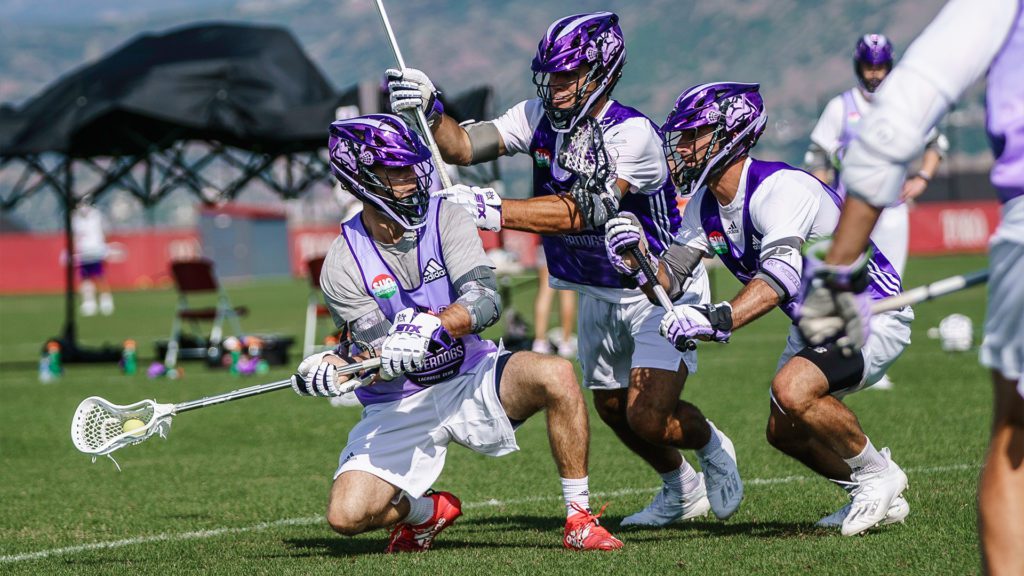
Waterdogs Rooted in Two-Way, Tough Mindset
By Josh Schafer | Jul 23, 2020
If Andy Copelan’s strategy for building a roster in the PLL wasn’t clear after the expansion draft, the first-year head coach doubled down on his system during the Entry Draft. For many, the first pick should’ve been obvious. It had to be Rob Pannell, an All-World attackman who’d won an MVP in 2018. It was the sexy, shot in the arm move for a team that lacked star power.
Copelan opted for Zach Currier, a two-way midfielder that does everything well. In the NHL, Currier would be considered a Patrice Bergeon type-player, someone who can immediately boost a team’s faceoff game, score a goal or play lockdown defense.
Currier is exactly what the Waterdogs want to be as a team, versatile, good in transition, and at his core, a scrappy, selfless guy.
“He's just a great team player and a flat out winner,” Copelan said. “He checks all those boxes of just kind of being an old school middie, who you know, hopefully, can really just be a dominant presence in between the arcs.”
Later in the Expansion Draft, Copelan snagged Ryland Rees, an All-World defenseman in 2018, who had already seen two other defenders leave the board in front of him. The foundation of the Waterdogs inaugural roster is rooted in the fact that, one way or another, someone passed up on them. Someone thought they’d be better off with someone else. Inside the locker room, that concept hasn’t been talked about much. They don’t really care what others are saying about their group because they believe they have something special in their versatility and prior experience playing together. It’ll be put to the test immediately in the team’s inaugural game against Pannell and Atlas at 4 p.m. ET this Sunday on NBC.
“(We’re going to be) a selfless team,” Currier said. “We don't have any guys that need their five points and need to get their highlight-reel goals to get posted on Instagram, so they can get their followers all pumped up...We're going to be making smart lacrosse plays and plays that help our team win as opposed to plays that are going to end up on Instagram.”
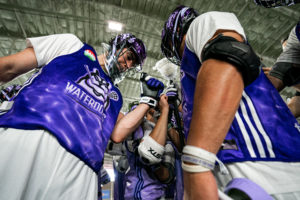
Familiar faces
Brodie Merrill likened the team’s first Zoom meeting to a first date. Everyone smiled but no one wanted to break the ice. The stark reality of a new franchise's first meeting happening online amid a global pandemic quickly dissipated when the guys took a look around the little squares.
Six of them had played on Team Canada together at the 2018 World Lacrosse Championships, which is the most Team Canada players on one team in the PLL. Four came off from last year’s champions, the Whipsnakes. Some traveled to Japan together in the offseason and others had played together professionally in other leagues.
For the guys on that Zoom call, who knowing the faces surrounding them and their championship pedigrees, it’s hard to understand why people would doubt the expansion team.
“People are writing us off saying that we're the least likely team to win this thing, when I'm looking up and down our roster thinking, how the hell were half of these guys unprotected? ” Currier said.
The roster boasts two All-World players from 2018 (Rees and Ben McIntosh), one of the game’s most storied defenders in lacrosse history, Brodie Merrill, and a 2018 Tewaaraton Award winner in Ben Reeves. That’s not even including guys like Currier, Drew Snider or Connor Kelly who’ve each won one at least one professional championship and all were All-American midfielders in college. And of course, the list of player accolades could go on and on.
At the faceoff X, the Waterdogs have a former Division-III Faceoff Specialist of the Year, Drew Simoneau, and the indoor game’s most dominant faceoff athlete over the past two seasons, Jake Withers. With that unit comes more familiarity as Merrill, Rees, and Currier have all winged faceoffs for Withers while playing for Team Canada.
The Waterdogs have built their team around dominating in between the two-point arcs, and that’ll likely start with groundballs at the faceoff X. Currier finished second all-time at Princeton in ground balls, Withers smashed the Buckeyes’ record while at Ohio State and a teammate referred to Merrill as “the king of groundballs.”
Currier and Withers have been playing together since they were eight-years-old and the early word from training camp is the Waterdogs could resemble the pair’s rugged Peterborough Ontario roots.
“I've never been on the other end of his fights,” Currier said of Withers' toughness. “I don't think I'd be living to tell the tale.”
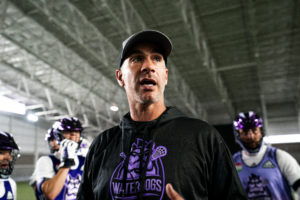
What the Waterdogs will look like on the field
Copelan watched every 2019 PLL game four or five times. The biggest takeaway he noticed was how quickly the game shifted from one end of the field to the other. With a shorter field and less space to travel between the arcs, early offense became critical in the PLL’s first season.
“As subtle as it may seem, I think it made a pretty big difference just in the feel of the game,” Said Merrill, who’s in his 15th season as a professional. “It was a lot more up and down, less of that kind of longer, more sustained possessions.”
The stats back up Merrill's observation. Last season the two teams with the best fast-break defense, the Whipsakes (who allowed 1.83 fastbreak goals per game) and the Redwoods (2.69) played in the championship game, and more goals were scored in the first 12 seconds of the shot clock than any other time slot during offensive possessions.
Part of dominating those first 12 seconds involves how a team rotates out players. If the Waterdogs play according to their roster makeup, they won't need to sub as much when they lose possession. Waterdogs attackman Ryan Drenner said he’s been surprised by how many of their midfielders can play defense. Drenner noted the Waterdogs call out when the opponent has an offensive midfielder stuck on defense and usually attacks that player. He doesn’t think other teams will have that advantage on the Waterdogs.
“We've focused a lot on transition,” Drenner said. “Transition is really going to be a big piece of our identity as a team but coach has focused on telling us we can't solely live and die by transition.”
Coplan’s reasoning is simple: The Championship Series will be too fast-paced. With four games in a short period of time, the Waterdogs won’t have the legs to make every game a track meet. When the offense settles down, the Candian and box lacrosse roots of several players will show through pick-and-rolls and two-man game concepts.
But the thing that Drenner believes will separate the Waterdogs is the offense's ability to shift gears quickly. If something doesn’t work on one end, the offense has emphasized quickly swinging it to the other end of the cage or feeding a downhill dodger like Kelly.
Drenner, who scored 19 goals last season, will be back playing X this year and quarterbacking the offense, something he believes to be a more natural role for him. It’s even easier this year, he noted, due to his new Canadian teammates' quick hands in front of the net.
“They just have such a knack for moving inside and finding space and presenting a target for you,” Drenner said. “It gives you, as a feeder, a lot of confidence in them, knowing they're going to catch anything you pass to them, and more often than not they're going to find the back of the net with it.”
In the inaugural season, the group of leftovers isn’t writing themselves off like so many of their former coaches had to. With the worst odds to win the Championship Series, the Waterdogs are just looking to prove they belong once more.
“That would be a remarkable accomplishment to go from expansion team to champion,” Copelan said. “I think that's like ESPN 30 or 30 stuff. So that'd be pretty cool.”



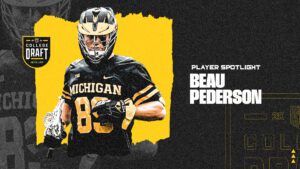
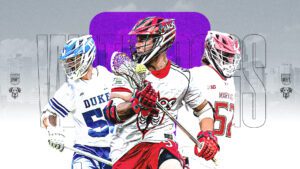

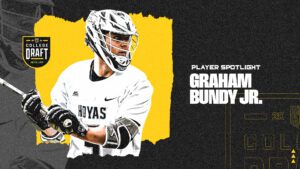
Pingback: exchange online plan 2
Pingback: it danışmanlık hizmeti
Pingback: fake rolex datejust
Pingback: KOOP ID-KAART VAN DENEMARKEN ONLINE
Pingback: instagram audit free
Pingback: 新越谷 ボルダリング
Pingback: buy dmt australia usa
Pingback: Fortune Games
Pingback: Deepweb
Pingback: 셔츠룸
Pingback: P226 Legion Full-size Wallpaper
Pingback: p226 mk25 full-size
Pingback: Buy research chemical online Melbourne
Pingback: Buy magic mushrooms online Australia
Pingback: sbobet
Pingback: baixar
Pingback: sbo
Pingback: 토토백화점
Pingback: trouver plus ici
Pingback: his comment is here
Pingback: mushroom chocolate bars for sale
Pingback: psilocybe mushrooms dosage
Pingback: บานประตู wpc
Pingback: Yoga
Pingback: ข้อดี ที่น่าสนใจ ของ เว็บดวงดีหวย
Pingback: illuminati official website